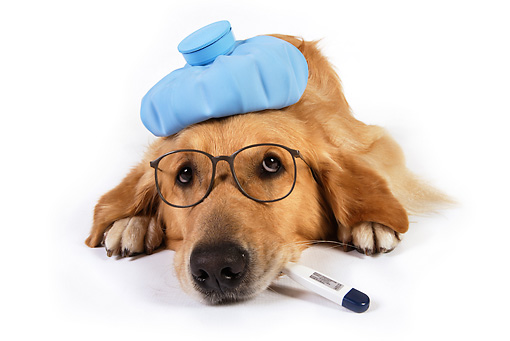 Think of Kennel Cough as a chest cold. Kennel Cough is highly contagious between dogs and does not just come from kennels. It is nicknamed that way because it can come from anywhere your Golden Retriever (or any dog for that matter) is around other dogs and kennels always have other dogs. It can be passed to other dogs even before symptoms are visible so even healthy looking dogs can pass it to your Golden Retriever. This affliction is commonly referred to as Bordetella but the technical name is Tracheobronchitis.
Think of Kennel Cough as a chest cold. Kennel Cough is highly contagious between dogs and does not just come from kennels. It is nicknamed that way because it can come from anywhere your Golden Retriever (or any dog for that matter) is around other dogs and kennels always have other dogs. It can be passed to other dogs even before symptoms are visible so even healthy looking dogs can pass it to your Golden Retriever. This affliction is commonly referred to as Bordetella but the technical name is Tracheobronchitis.
Symptoms
- Persistent hacking cough
- Lethargy
- Possible other symptoms
- spit up white foam
- occasionally vomit
- slight runny nose
- loss of appetite
- reddened watery eyes
Treatment
Disclaimer: I am not a Veterinarian. The following advice is based on personal experience and research but does not replace the Vet. When it doubt, as always, take your Golden Retriever to an expert.
The good news is that except in very young or very old dogs, Kennel Cough typically passes fairly quickly with no long lasting effect. It is possible Kennel Cough could develop into a more serious condition however so watch your Golden. If the condition gets worse or if the symptoms last more than two weeks you will want to take her into the vet for professional help. If in fact the affected dog is under 6 months or over 9, you should consult your vet early on as very young or old dogs have lowered immunity and are at elevated risk.
 For a healthy adult Golden Retriever, try to let your pooch rest. No chasing balls or long walks. Give them plenty of water. It’s rumored that humidifiers help but I’ve not confirmed that as fact. A teaspoon of honey several times per day can help with sore throat. As long as it does not continue to worsen, they should recover on their own with rest, food and plenty of clean water.
For a healthy adult Golden Retriever, try to let your pooch rest. No chasing balls or long walks. Give them plenty of water. It’s rumored that humidifiers help but I’ve not confirmed that as fact. A teaspoon of honey several times per day can help with sore throat. As long as it does not continue to worsen, they should recover on their own with rest, food and plenty of clean water.
Prevention
If your Golden Retriever is ever around other dogs they are at risk. A boarding kennel, the dog park, a visit to Home Depot, visiting friends with dogs, going to the vet, doggy day care or pretty much any time they are exposed to other dogs they are at risk. The problem is that Golden Retrievers NEED exposure to other dogs for proper socialization so keeping them isolated is typically not a good option unless they are very young or very old. all that said, if you spot a dog that is coughing, avoid it.
 Some varieties of Kennel Cough are essentially caused strains of the parainfluenza virus but most combination vaccinations that your puppy gets annually should protect against this. Check with your vet to assure parainfluenza prevention is included in regular vaccinations.
Some varieties of Kennel Cough are essentially caused strains of the parainfluenza virus but most combination vaccinations that your puppy gets annually should protect against this. Check with your vet to assure parainfluenza prevention is included in regular vaccinations.
There is a bi-annual bordetella vaccination that can be provided by your vet. It is typically delivered nasally but can be done as an injection if they just can’t handle it being squirted in the nose (River can’t stand that). This will increase your Golden Retriever’s chances of not getting Kennel Cough but just like the human flu shot, it is not 100% coverage. We at Texas TLC Goldens strongly recommend this optional but relatively inexpensive preventative treatment if your dog is going to be around other dogs much at all and in fact it will be required for a stay at any good quality kennel. It can be delivered as often as every 6 months. If the kennel or daycare facility does not require proof of this vaccination in the past 6 or less months, I would avoid it.
Wrap Up
It is likely your precious Golden Retriever will get Kennel Cough some time in it’s lifetime; just like it’s likely you will someday get a cold; it happens. Do all that you can to prevent it but don’t blame your kennel if for some reason your Golden Retriever gets it. ALL good kennels require proof of vaccinations (including current bordetella) but that is not 100% coverage; it just helps. If it happens and your pooch is an otherwise healthy adult, make your pet comfortable, provide plenty of water and rest. If it goes on too long or does not improve in a week or two, see your vet. Very young or very old Golden Retrievers should be seen by your vet ASAP.

